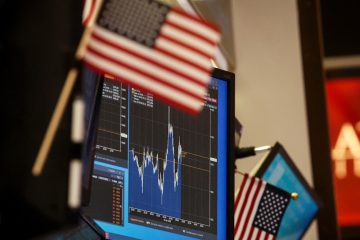Buffett’s Bet with the Hedge Funds
In 2008, Warren Buffett issued a challenge to the hedge fund industry, which in his view charged exorbitant fees that the funds’ performances couldn’t justify. Protégé Partners LLC accepted, and the two parties placed a million-dollar bet. Buffett contended that, including fees, costs and expenses, an S&P 500 index fund would outperform a hand-picked portfolio of hedge funds over the 10 years ending Dec. 31, 2017. The bet pits two basic investing philosophies against each other: passive and active investing.
A Wild Ride
As of spring 2016, Buffett appears to have taken the right side of the passive-active fight (though it’s worth pointing out that he picks investments for a living), but it’s been quite a saga. Shortly after the wager started on Jan. 1, 2008, the market tanked, and the hedge funds were able to show off their strong suit: hedging. Buffett’s index fund lost 37% of its value, compared to the hedge funds’ 23.9%. Buffett then beat Protégé in every year from 2009 through 2014, but it took four years to pull ahead of the hedge funds. (See also: Hedge Fund Fees: Exotic Expenses.)
In 2015, Buffett lagged his hedge fund rival for the first time since 2008, gaining 1.4% versus Protégé’s 1.7%. Now that the post-crisis rally appears to have lost at least some of its steam – no one expects to see another 32% year for the S&P 500, as in 2013 – the question is whether another downturn could hand the advantage back to Protégé. But time is running out. Altogether, Buffett’s index fund bet is up 65.7%, while Protégé’s basket of funds (more on that below) is up 21.9%. Given the downturn the market would have to see this year to close that gap, the hedge fund managers are likely hoping they lose.
What Exactly Is the Bet?
First, a few details about Buffett and Protégé’s wager. The money Buffett has put down is his own, not Berkshire Hathaway’s (BRK-A, BRK-B) or its shareholders’. His chosen vehicle is Vanguard’s S&P 500 Admiral fund (VFIAX). Protégé’s is the average return of five funds of funds. The specific funds have not been disclosed, in line with SEC rules on hedge funds’ marketing.
The million dollars in question will go to charity: Girls Incorporated of Omaha if Buffett wins, Friends of Absolute Return for Kids if Protégé wins. In an odd twist, the money in the pot, which was supposed to be boring and secure, has seen by far the best return. The sides initially put $ 640,000 (split evenly) into zero-coupon Treasury bonds that were structured to rise to $ 1 million over 10 years. But the financial crisis saw interest rates plunge and sent the bonds up to nearly $ 1 million in 2012.
By mutual agreement, the bettors sold the bonds and bought Berkshire B-shares, which were worth $ 1.4 million as of mid-February. That 119% return blows both the Vanguard fund and Protégé’s funds of funds out of the water. If Berkshire’s stock drops, the winning charity is guaranteed $ 1 million anyway, and if the pot remains larger than originally agreed amount, the charity gets the surplus.
The money is being held by the Long Now Foundation in San Francisco, a non-profit which holds parties to long-term bets accountable. To give a sense of how long-term they like to think, the site lists the bet’s duration as: “10 years (02008-02017).”
Fortune Magazine, and specifically retired senior editor-at-large Carol Loomis, has exclusively reported on the bet’s results since 2008. Loomis is a long-time friend of Buffett.
The Tortoise and the Hare
To mere mortals, this may look like a bet between a handful of Masters of the Universe and the world’s third-richest person, the Oracle of Omaha. But Buffett has characteristically hit on a humbler metaphor for the wager: Aesop’s tortoise and hare. While the hedge funds and funds of funds – the hares – bound around between exotic asset classes and elaborate derivatives, charging high fees for their troubles, passive index investors – the tortoises – worry about other things while the market, significant short-term turbulence aside, gradually gains in value.
Protégé sees things differently, writing before the bet started, “Hedge funds do not set out to beat the market. Rather, they seek to generate positive returns over time regardless of the market environment. They think very differently than do traditional ‘relative-return’ investors, whose primary goal is to beat the market, even when that only means losing less than the market when it falls” (ie, exactly what happened). Protégé argues that “there is a wide gap between the returns of the best hedge funds and the average ones,” which justify the fees at the center of the argument. (See also: The Multiple Strategies of Hedge Funds.)
The Bottom Line
Everyone and their mother has an opinion about low-fee, passive index investing versus actively managed investments. The Buffett-Protégé contest provides fodder for arguments on both sides. While Buffett appears set to win according to the terms of the bet, the hedge fund side did show the merits of a bit of extra tweaking and pruning following the 2008 crash, which put them ahead of Buffett’s Vanguard fund until 2012. And Protégé did beat the market in the previous cycle: their flagship fund returned 95% from 2002 to 2007, net of fees, versus 64% for the S&P 500. Whatever the final tally turns out to be in the spring of 2018, the active-passive argument will rage on, and some lucky charity will be the real winner.
Read more: Buffett’s Bet with the Hedge Funds: Year Eight (BRK-A, BRK-B) | Investopedia http://www.investopedia.com/articles/investing/030916/buffetts-bet-hedge-funds-year-eight-brka-brkb.asp#ixzz42WJsZFQF
Follow us: Investopedia on Facebook

